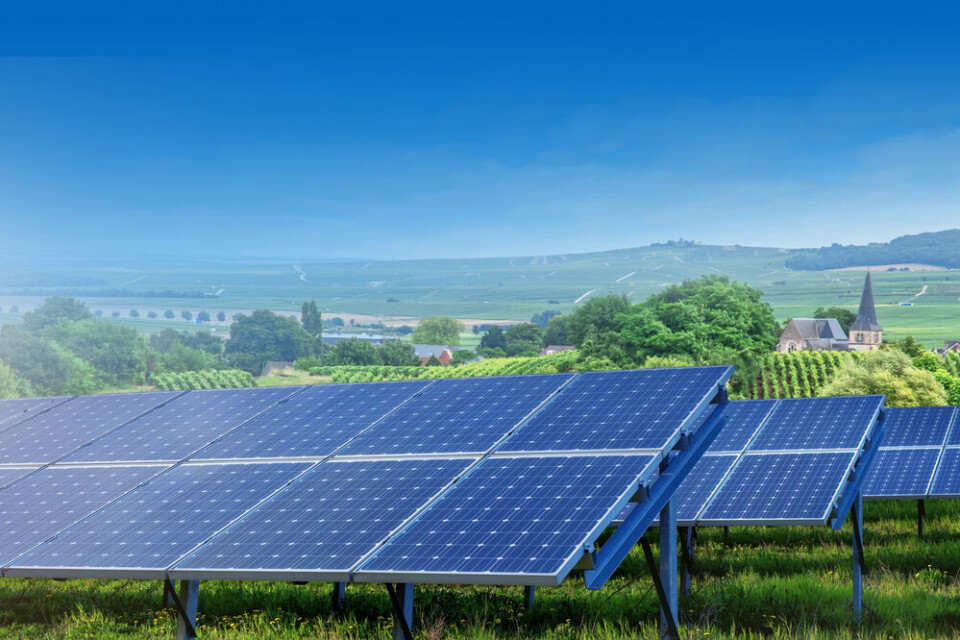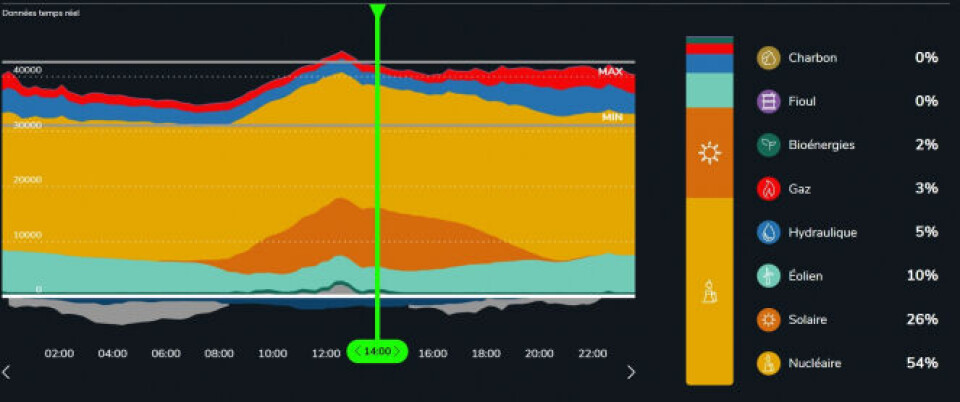-
La Voie Bleue: European Cycle Route of the Year is in France
700km bike path linking Luxembourg and Lyon has been crowned winner of the 2026 title
-
Before and after: Garonne river floods in south-west France
Satellite images show extent of flooding from back-to-back storms in February
-
Home insurance increases expected in France after floods
Compensation costs for the recent storms and flooding across the west and south-west is estimated to be in the billions of euros
France sets new peak solar power output – but not due to heatwave
The country, however, is still failing by a long way in its targets for renewable energies

France recorded a new peak output of solar-produced electricity on August 7 at over 10.7GW – the equivalent amount to what 10 nuclear power plants can produce on average.
The peak came around 14:00 on what was a particularly clear day.
The graph below shows France’s real-time energy mix on August 7 and is produced by the Réseau de Transport d'Électricité (RTE), the electricity transmission system operator of France.
It shows at that moment that solar power was responsible for 26% of France’s electricity.

Screenshot / Réseau de Transport d'Électricité
France has massively stepped up its solar power capacity in the past year, the main reason for achieving this peak energy output, along with it having been a particularly sunny day.
By the end of the third quarter of 2021, Enedis, France’s electricity network operator, had connected more solar panels to the grid than during the whole of 2020, i.e. over 40,000.
It brings the number of connected solar panels in France to over 500,000, with a total potential output of 11GW. This is enough to power 2.9 million households.
“Enedis noted a big rise in connection requests in 2021, in particular for high-power installations – ground-mounted and floating solar plants in particular,” the company states.
Read more:Solar panels on French property: how to make your own electricity
Read more: Is our income from selling home solar panel power taxable in France?
Nicolas Leclerc, cofounder of Omnegy, a company specialising in purchasing energy, said the increase in France’s solar energy output is “encouraging”.
“We are on track to reach the objectives set by the PPE, to have an installed capacity in 2024 of around 20 GW and 35 GW in 2028,” he told France Inter.
The programmation pluriannuelle de l'énergie (PPE) sets out the measures and actions that will enable France to decarbonise energy-related sectors and achieve carbon neutrality by 2050.
Despite this, solar energy is still a very minor part of France’s overall energy mix, representing roughly 2.2% of electricity produced in the country, according to 2019 figures from EDF. It is highly likely that this has increased since then, but there are no more recent publicly available figures.
France gets the vast majority of its electricity from nuclear energy.
Heatwaves no help for solar energy
France’s peak solar energy output has come in a summer when the country is facing a series of heatwaves.
But high temperatures are not necessarily good for solar panels.
Too much heat can dramatically reduce the ability of solar panels to produce power, sometimes by as much as 25%, according to CED Greentech, a solar equipment supplier in the US.
Mr Leclerc of Omnegy said that the recent heatwaves and droughts will have had a “counterproductive effect” on the output of solar panels.
France failing in renewable energy targets
France was the only EU country to have failed to achieve the target of having renewable energy make up 23% of its energy mix by 2020, set out in a 2009 EU directive.
At the time, renewable energy represented just 19.1% of the country's energy mix.
This failure is one reason why the French state has faced two considerable legal cases.
In one case, the commune of Grande-Synthe appealed to France’s Conseil d'État, the highest administrative court in the country, about France’s inaction over reducing its greenhouse gas emissions.
In November 2020, the Conseil d’État ordered the French government to justify its actions in reducing carbon emissions. The Grande-Synthe commune was unhappy with the report the French state eventually produced in March this year and have pledged to push for a financial penalty.
Another case was brought before the tribunal administratif de Paris by a collection of organisations under the banner of l'Affaire du siècle.
On October 14, 2021, the court ruled in favour of the organisations and gave the French state until December 31, 2022 to "repair the ecological damage" caused by the country’s failure to meet its commitments to reduce greenhouse gas emissions.
Read more:French court orders government to honour its climate promises
Related stories
France plans renewable energy boost as inflation threatens projects
EDF nationalisation is end of bumpy ride for French investors
Coloured solar panels can offer solution for protected areas in France
Can you have solar panels on homes in historic areas of France?
























